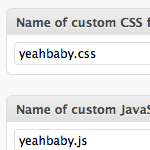Monthly archives: May 2010

WordPress JSON API Plugin
WordPress already kind of has an XML API. Basically, RSS feeds. WordPress creates feeds for all kinds of stuff: recent posts, comment threads on any Page or Post that has comments, category-specific, tag-specific, and more. The codex covers all this and we’ve also covered creating your own unique feeds that could literally be from any data in your WordPress database.

WordPress Default CSS Styles
WordPress gives us full control over the presentation of our websites. We specify which classes and attributes to use in our template files, and then apply CSS using our theme’s custom stylesheet. Behind the scenes, WordPress generates its own classes and IDs, and applies them to specific HTML elements in theme files and database content. Having these default hooks available makes it super-easy to custom-style your theme’s blockquotes, post images, widget items, and much more.
How To AJAXify WordPress Theme
Deluxe Blog Tips shares an excellent tutorial expanding on Chris Coyier’s screencast on Ajaxifying a WordPress Theme. Features include improved Ajax functionality, scrubbed “hashized” href attributes, and fully functional forward/back navigation.

Complete Guide to WordPress 3.0 Awesome New Features
One thing that people love about WordPress are all of the awesome new features rolled out with each new version. WordPress has come a long, long way since I first started working with it back in 2005, and the soon-to-be released version 3.0 takes WordPress’ powerful functionality even further. WordPress 3.0 is currently in public beta, so you can grab a copy and play around to see all the amazing new hotness. New features include a new default theme, custom post-types, and a spicy new menu manager. Version 3.0 will be available soon – so let’s check out some of the latest and greatest new features..
WordPress 3 Custom Taxonomies
In-depth overview from Paul Kaiser on how WordPress 3.0 is expanding and improving upon creating custom taxonomies, including how they can now be hierarchical. Most importantly Paul shows how (and why) they can be used in WordPress themes.
Prefix Everything
Andrew Nacin:
Anything you create in the global namespace has the potential to conflict with a theme, another plugin (including one you wrote), and WordPress core itself. Thus, prefix everything with a unique-enough character set. For example, all functions I write always start with “nacin_”, and I make sure that my functions are unique across all of my plugins.
In this recent post, I used some fairly generic function names like custom_css_hooks. Andrew is saying that names like that are a little too generic and that it’s possible another plugin could use that same name which would be rather disastrous. Since it’s totally internal anyway, I should have called it digwp_custom_css_hooks, which would be far less likely to meet a conflict.
WordPress on Microsoft
Yes, it runs WordPress on Windows and SQL Server.
Editor’s note: 404 link removed.

Specify Unique CSS File Per Post
I’m a HUGE fan of being able to link up a CSS file on a per-page basis. I just find it extremely common that a page needs CSS styling unique to it, and I hate litering a sites main stylesheet with customizations that only one particular page needs. We’ve talked about this before, and even created a custom method for doing so, as well as mentioned the art direction plugin, which makes this easily possible.

Add Private Content to Posts via Shortcode
Recently, WP-Mix posted an incredibly useful technique that uses a shortcode to add private content to blog posts. This functionality makes it easy to manage leftover data, miscellaneous notes and other communication by keeping everything together with its corresponding post. Consolidating information like this helps to streamline flow and organization into the future.








